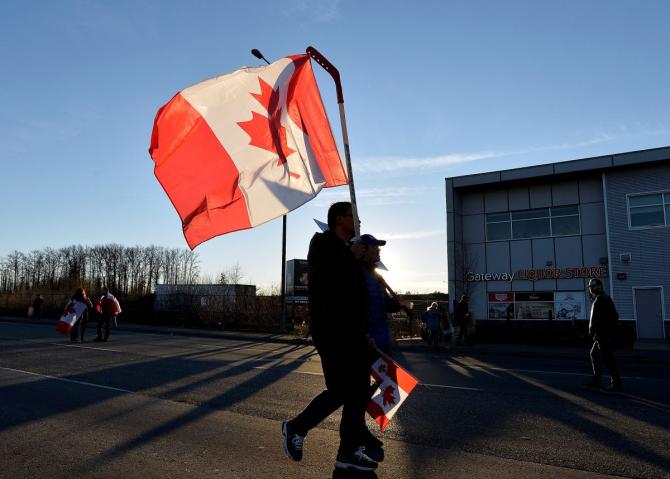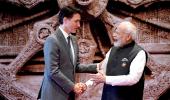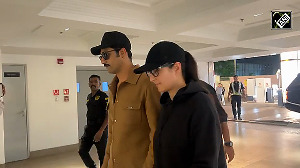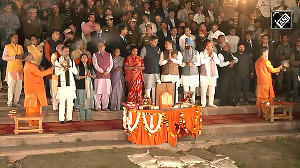Canada's allegations of India's involvement in the killing of a Sikh separatist in Surrey that sparked a diplomatic row between the two nations are based on both human and signals intelligence and inputs from an ally from Ottawa's Five Eye intelligence network, a media report has said citing the Canadian government sources.

Tensions flared between India and Canada early this week following Prime Minister Justin Trudeau's explosive allegations of the 'potential' involvement of Indian agents in the killing of Khalistani extremist Hardeep Singh Nijjar on his country's soil on June 18 in British Columbia.
India had designated Nijjar as a terrorist in 2020.
India angrily rejected the allegations as 'absurd' and 'motivated' and expelled a senior Canadian diplomat in a tit-for-tat move to Ottawa's expulsion of an Indian official over the case.
The Canadian government has amassed both human and signals intelligence in a months-long investigation of the Sikh man's death that has inflamed relations with India, CBC News, a division of the Canadian Broadcasting Corporation, reported on Thursday quoting sources.
That intelligence includes communications involving Indian officials themselves, including Indian diplomats present in Canada, say Canadian government sources.
The intelligence did not come solely from Canada. Some were provided by an unnamed ally in the Five Eyes intelligence alliance, the public broadcaster said.
Canada is part of a 'Five Eyes' network which is an intelligence alliance consisting of the United States, United Kingdom, Australia, Canada and New Zealand.
The report said the diplomatic crisis unfolded progressively behind the scenes. Canadian officials went to India on several occasions seeking cooperation in the investigation of Nijjar's death, the report claimed.
Canada's National Security and Intelligence Adviser Jody Thomas was in India over four days in mid-August, then again for five days in September. That last visit overlapped with a tense meeting between Prime Minister Trudeau and Indian counterpart Narendra Modi, it said.
'Canadian sources say that when pressed behind closed doors, no Indian official has denied the bombshell allegation at the core of this case -- that there is evidence to suggest Indian government involvement in the assassination of a Canadian citizen on Canadian soil,' it added.
Canada is weighing retaliation but has taken no decision yet, said government sources in Ottawa.
On Thursday, India asked Canada to come down hard on terrorists and anti-India elements operating from its soil and suspended visa services for Canadians, as escalating tensions between the two nations over the killing of Nijjar pushed their ties to an all-time low.
India also asked Canada to downsize its diplomatic staff in the country, arguing that there should be parity in strength and rank equivalence in the mutual diplomatic presence. The size of Canadian diplomatic staff in India is larger than what New Delhi has in Canada.
When asked about the intelligence reports, Deputy Prime Minister Chrystia Freeland said she couldn't comment without risking the investigation and Canada's obligations to its Five Eyes partners.
"That partnership rests very much on those intelligence conversations being held in confidence," she told CBC News Network.
Asked if Canada is thinking about retaliating by pausing visa processing for Indian visitors, Freeland said the government is focused on bringing the killers to justice.
"This is not about geopolitics. This is about Canada and the safety of Canadians in Canada. This is about the rule of law," she said.
The Canadian government has not released its evidence and has suggested it could emerge during an eventual legal process, the CBC report said.
Harjit Sajjan, Canada's minister of emergency preparedness, said Prime Minister Trudeau publicly implicated India in the murder of Nijjar because he learned the story was going to come out in the media.
Sajjan, the Liberal Member of Parliament for Vancouver South, said the investigation into Nijjar's death is still ongoing, but Trudeau wanted to ensure Canadians had "the accurate information" about the story before it made headlines.
He said the decision to come out in the public before the conclusion of the inquiry was made with the full consultation of the appropriate agencies involved.
"Making sure to give calm to Canadians is an absolute priority for us. And this is one of the reasons why the prime minister went out, is to give confidence and calm to Canadians -- and just in case somebody is trying to use certain information to divide Canadians, which we have seen many times in the past," Sajjan, himself a Sikh, added.
Prime Minister Trudeau on Thursday said Canada is not looking to 'provoke or cause problems' with India as he urged New Delhi to take the matter 'extremely seriously' and work with Ottawa to 'uncover the truth'.
"We call upon the government of India to take seriously this matter and to work with us to shed full transparency and ensure accountability and justice in this matter," Trudeau said while responding to questions on the diplomatic row between India and Canada.
"We are a country of the rule of law. We are going to continue to do the work necessary to keep Canadians safe and to uphold our values and the international rules-based order. That's our focus right now," added Trudeau, who is here to attend the 78th session of the United Nations General Assembly in New York.
When asked whether his government would take any retaliatory measures following India's suspension of visa services for Canadians, Trudeau said that his government was not looking to provoke or cause problems.
The Canadian government has not released its evidence and has suggested it could emerge during an eventual legal process, the CBC report said.
The United States on Thursday said it supports Canada's efforts to investigate allegations of India's involvement in the killing of Nijjar, observing that no country can get any 'special exemption' for such kind of activities.
The US government has not confirmed or denied that it was the Five Eyes ally providing some of the signals intelligence.
But National Security Advisor Jake Sullivan told reporters at a White House news conference that the United States has been in frequent contact with Canada on this issue.
"I'm not going to get into the substance of private diplomatic conversations, but we are in constant contact with our Canadian counterparts. We are consulting with them closely. We support the efforts that they are undertaking in this investigation and we have also been in touch with the Indian government as well," he said.
"We have deep concerns about the allegations and we would like to see this investigation carried forward and the perpetrators held to account. That is what the US has stood for from the moment this emerged in public and we will continue to stand for that until this fully plays its way out," he said.
Refusing to respond to questions on the evidence of Canadian allegations, Sullivan said he is not going to speak to either intelligence or law enforcement matters from this podium.
"I will let that process play out. We are in, as I said before, continuous communication and consultation with the Canadian government and we will remain so as we go forward," he said.











 © 2025
© 2025